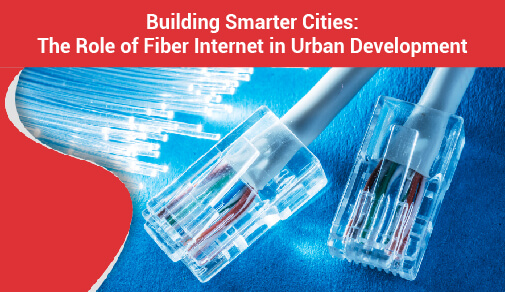Building Smarter Cities: The Role of Fiber Internet in Urban Development
Tuesday, Jul 09, 2024 · 4 minutes


BUILDING SMARTER CITIES: THE ROLE OF FIBER INTERNET IN URBAN DEVELOPMENT
Tuesday, Jul 09, 2024 · 4 minutes
The idea of a smart city is gradually becoming a new generation of city development worldwide. Therefore, thanks to innovative technologies, cities are becoming more efficient, ecological, and comfortable. At the heart of this transformation lies a critical infrastructure component: fiber internet and its components, such as fiber optic cables.
This high-speed and, most importantly, reliable connectivity is the basis for most smart city applications, whether traffic control systems or smart energy management. This paper aims to outline how fiber internet contributes to realizing smart cities in urban settings.
Fiber internet, commonly called fiber-optic internet, is based on the technology of glass or plastic fibers that carry data in light. This technology offers several significant advantages over traditional copper-based internet connections:
Smart cities apply data and intelligent technologies to improve the quality of life in urban spaces. Fiber internet plays a pivotal role in this transformation by providing the robust connectivity required for various smart city applications:
Smart technology is a data-driven system that is put in place to optimize various aspects of a city. Fiber internet infrastructure is the cornerstone of smart infrastructure, enabling the following innovations:
There are numerous economic and social benefits of fiber internet in smart cities:
ACT Fibernet, which is one of the major ISPs providing internet services, was actively participating in the implementation of smart city projects with their fiber-optic connection service. Their contributions include:
There is scarcely any sector of smart city construction that could do without fiber internet as a means of communication because it is fast, reliable, and very suitable for managing large bandwidth needs.
These findings indicate that the role of fiber internet providers will become even more critical as cities deepen in the future by promoting sustainable economic growth, improving living standards, and promoting sustainable development. Hence, the prospects of smart cities being created soon are promising owing to new rollouts like ACT Fibernet and integrated networks.

A referral link has been sent to your friend.
Once your friend completes their installation, you'll receive a notification about a 25% discount on your next bill
![]() Please wait while we redirect you
Please wait while we redirect you

![]() One of our representatives will reach out to you shortly
One of our representatives will reach out to you shortly

One of our representatives will reach out to your shortly
![]() Please wait while we redirect you
Please wait while we redirect you

Please enter your registered phone number to proceed

Please enter correct OTP to proceed


Dear customer you are successfully subscribed
Please wait while we redirect you

Your ACT Shield subscription has been successfully deactivated

Dear user, Your account doesn't have an active subscription

Dear customer Entertainment pack is already activated.
Please wait while we redirect you